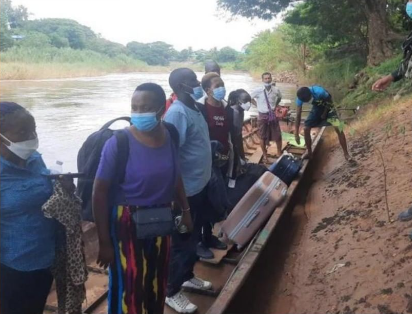Government Rescued People Trafficked To Myanmar Tricked To Find Jobs There

Kenya has helped additional people who were trapped in Myanmar after falling prey to a dishonest “work” gang with connections to Nairobi.
Seven Kenyans were reportedly rescued from Myanmar over the weekend and transported to Thailand in preparation for their return home, according to the Ministry of Foreign Affairs.
While four others were still being imprisoned at the Chinese factories from which they had been smuggled into Thailand.
The victims’ firsthand experiences indicate that the labor that Kenyans are required to perform in the industries of the Southeast Asian nation is comparable to slavery.
“They locked us up in a room for seven hours without communication and food after which they asked us if we wanted to die or continue with work and we of course chose to live,” Rose Mwikali, one of the victims who has since been repatriated to Kenya, told Nation.
She claimed that people who were unable to work at the cyber cafes were forced into prostitution since the bosses of the factories viewed them as being “useless.”
Following distress calls, the government said last week that it had rescued people who were trapped in Myanmar, Cambodia, Indonesia, Laos, Malaysia, Brunei, the Philippines, Singapore, Thailand, and Vietnam.
Kenya issued a warning about two weeks ago cautioning its citizens not to apply for jobs in Asian nations unless they can verify their legitimacy before departing.
The government claimed that it is “overwhelmed” by distress calls from citizens who have been tricked into accepting positions they are not qualified for in South East Asia, where it suspects a human trafficking ring is operating.
There is no diplomatic representation for Kenya in Myanmar.
The majority of individuals misled, according to the Kenyan Embassy in Thailand, are low-income Kenyans who were forced to sell their meager possessions, such land, in order to pay for their travel expenses.
The victims are tricked into believing they will be hired for employment in teaching, sales, or customer service, only to be sold into slavery in Myanmar and neighboring Laos to labor in “factories” engaged in cybercrime, prostitution, and drug trafficking.

 The Road to Victory: President Ruto’s Triumph in the August 2022 General Election
The Road to Victory: President Ruto’s Triumph in the August 2022 General Election  Finance Bill 2023- The Benefits
Finance Bill 2023- The Benefits  How Small Businesses Can Use AI to Increase Sales In Kenya
How Small Businesses Can Use AI to Increase Sales In Kenya  Not Today; Matiang’i’s Lawyer Says His Client Will Not Appear Before DCI Today
Not Today; Matiang’i’s Lawyer Says His Client Will Not Appear Before DCI Today  Senator Onyonka Urges President Ruto To Be Careful On How He Handles Matiang’i’s Case
Senator Onyonka Urges President Ruto To Be Careful On How He Handles Matiang’i’s Case  Form One Student Beaten To Death By Teachers Over Alleged Physics Exam Cheating
Form One Student Beaten To Death By Teachers Over Alleged Physics Exam Cheating